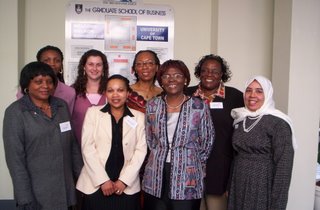
Librarians @ HERS SA Academy 2005
I was fortunate to attend Kay Raseroka’s presentation at the third HERS SA Academy in Cape Town on 13 September 2005, and meet up with six librarians who were attending the Academy. The Academy is a week long programme that looks at the issues and challenges facing higher education, as presented by leaders in the various sections and units in higher education. I have reported on my experience in the October 2003 issue of L-i-t. For more information about HERS SA and the Academy see www.hers-sa.org.za/
These librarians attend the Academy with the approval of their Vice Chancellors and were amongst 73 delegates in higher education in South Africa, and 10 women from other parts of Africa together. They have the opportunity to share experiences and learn from each other, as well as from experts in the field. These librarians will be part of the Academy alumni who will be invited to attend the HERS Mid-America Summer Institute for Women in Higher Education in 2006. I hope all the librarians alumni will apply and a bigger contingent of librarians will be able to attend the Summer Institute in 2006.
Kay Raseroka was the leader and expert in LIS who the delegates heard from. She is the immediate past president of IFLA and Director at University of Botswana,. Her talk was on the strategic direction of academic libraries. I was surprised how unlike a Library Director her conversation was. She talked not as a manager, but as a librarian. She started off with a truth known to all librarians that libraries are short of funding. Yet University management say that Libraries are at the heart of the University. She described the typical student that we see in libraries today; students who come from schooling where they learn from textbooks, if they have any, more likely it would be underlined photocopies and that they have no interaction with knowledge. At University these students will be expected to do the opposite. The University, the place to which these students come, is interested in publication. The challenge to librarians is to support both the learning of students who do not know what it means to be University students and the academics. The academics use the library when they are most desperate, and complain of that librarians do not understand them as academics. Yet the academics have access to e-journals from their offices but thinks it comes from the Internet. Kay made it clear that librarians collected them, paid for them and rendered it accessible.
She proposed that academics partner with librarians to help students in learning how to learn and persuasively argued that students respect only the academics and will come for information literacy classes offered by librarians only when their lecturers tell them to because they want the marks. She further argued that plagiarism, copyright and creating local content is interlinked, that to generate meaningful knowledge, our students have to interact with the information, not merely regurgitate. Would you believe that there were lecturers there who had not thought of partnering with librarians to fight plagiarism and that they do not know what their library had to offer? This emerged in the lively discussion session after her presentation.
I found her most inspiring because she speaks what is in the minds and the hearts of the librarian on the frontlines and she restores my faith that the work we do contributes to putting things right in the world.
11 October 2005
Amended:
No comments:
Post a Comment